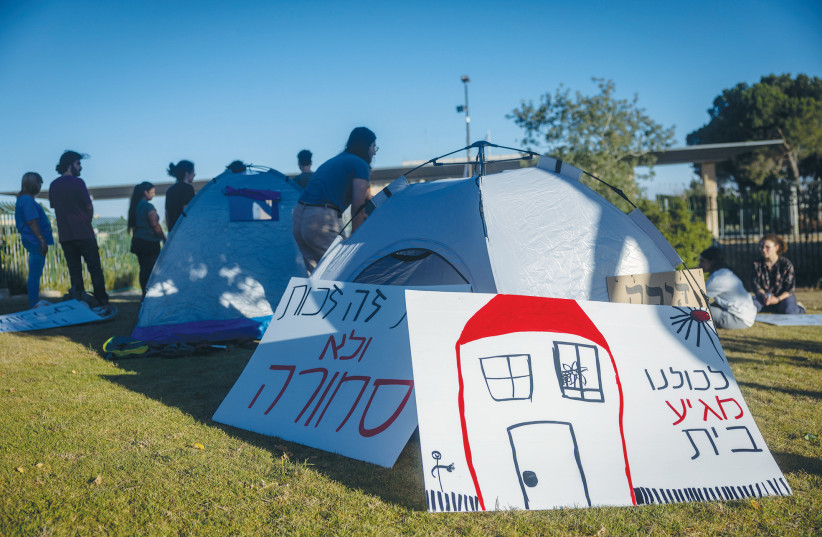This year, I spent Rosh Hashanah in London. The period coincided with much publicity given to Britain’s new prime minister, Liz Truss, whose controversial concept of halting inflation covered the pages of the UK press and led to her resignation just 44 days after being elected. Since then, much has been written about how Britain will cope with rising fuel costs, mortgage repayments and simply being able to make ends meet.
With the pound at an all–time low and the shekel at an all–time high, the financial happenings in the UK were of particular interest to me (as it is to all Israelis living on UK pensions). How well I remember the good old days when the exchange rate was NIS 8 to the pound.
Returning to Israel, I was looking forward to a presentation by the deputy governor of the Bank of Israel, Andrew Abir. The title of his talk was “The return of inflation? Challenges for monetary policies.” The event was organized by Israel, Britain and the Commonwealth Association (IBCA).
Why are housing prices in Israel so high?
British-born Abir said that compared to many countries, Israel is doing well and enjoys full employment, with those in the hi-tech world earning impressive salaries. However, when it comes to purchasing a home, the picture is somewhat different, as in the past year prices have soared to an all-time high, making it virtually impossible for far too many to become property owners. The reason, Abir explained, is that the number of new homes being built is way below what is required.

In 2021, there were 63,300 building starts; however, according to the Israel Building Association, some 100,000 building starts are required annually to meet the demand. When demand outweighs supply, inevitably prices rise, resulting in the improbability for many to purchase an apartment. Abir commented (perhaps with tongue in cheek) that he was preparing a tent in his garden for his children.
The current government’s plans include a commitment to ensure an annual figure of 70,000 building starts by the year 2025. However, with the constant change of government, commitments fall by the wayside. Abir endorsed this unfortunate reality, attributing challenges in the housing market to the lack of government continuity, without which there cannot be a meaningful change for the better. Inevitably, the deterioration in our education system, together with the shortage of doctors and nurses, can be attributed equally to the instability of governance.
Israel: A country of haves and have-nots
We are four days away from the fifth election in less than four years, the cost of which is estimated at NIS 2.9 billion. While being informed that Israel is doing better financially than most countries, the fact is we have become a two-tiered society of the haves and the have-nots. Joseph Gitler, founder and chair of Leket, an organization that collects food to distribute to 250,000 citizens each week because they cannot afford to feed themselves, told the Magazine that the elderly are requiring help in many additional directions, with some having to choose between buying food and turning on the heat.
GITLER ADDED that this dire situation is not limited to age. There are many of the younger generation who find themselves in the same situation. Do our politicians comprehend this disturbing reality, especially for a country that is supposed to be doing well financially?
The high cost of living in Israel plus the concept of never being able to own an apartment is affecting many young couples. They are looking toward other countries where the cost of living and the purchase of a home is more credible. Readers may have viewed a recent program on i24 news, which highlighted Portugal as attracting Israelis. The interviewees said how much easier life was for them in Portugal than it had been in Israel. The cost of living is considerably lower by 48%. A number had already purchased their own home – something impossible had they remained in Israel.
Other interviewees on the program gave the high cost of rentals in the center of the country, where most employment is to be found, as a reason for Israelis seeking a home elsewhere. Israel has failed to situate industry, hi-tech and innovation projects in outlying periphery areas. Where are the plans to create transportation infrastructure, thereby shrinking distances and being able to offer job opportunities and homes at affordable prices?
Recently traveling by road to and from Eilat – something I had not experienced in years – I observed the vast open desert spaces crying out for industry and homes but, first and foremost, for roads and railway lines. What happened to Ben-Gurion’s dream of developing the Negev? This is a small country where, if the modern infrastructure were provided, distances would be of far less consequence.
Sadly, however, instead of addressing the needs of Israel and its population, we are once again on the merry-go-round of elections that could well lead to a sixth or even seventh election. The chances of a new government being formed are very low. Even if a potential prime minister is able to put together the magical 61 seats, one can only guess how long such a government would survive.
We recently celebrated Sukkot when we read Kohelet (Ecclesiastes). It is there that we are reminded that “For everything there is a season...” Surely, the season is long overdue to create the tools that can implement electing a government that cares for its people rather than itself. Our current electoral system is democracy gone mad. The season for innovation is long overdue.
The writer is the chair of Israel, Britain and the Commonwealth Association (IBCA). The views expressed are hers alone.
